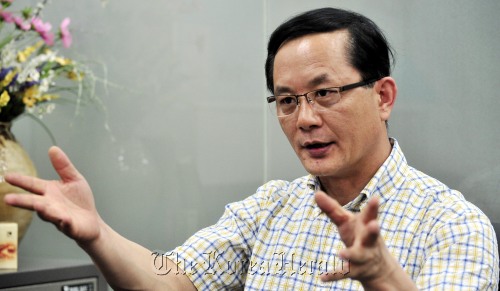“(Her death) was traumatizing and made us question if we should keep doing this. But we decided not to stop because otherwise, we wouldn’t be able to know about the inhumane crimes committed in the North.”
Kim’s solidarity has also sent in about 300 USBs technically modified to avoid detection.
The USBs do not contain any propaganda, but information on “what the defectors found surprising in the South,” dozens of new media programs such as PDF viewer, MP3 player software and e-books to enable more North Koreans to view South Korean video and text files, Kim said.
“Contrary to what we had expected, copies of Wikipedia entries turned out to be the most popular (among the North Koreans),” he said.
Currently, only five homepage servers are registered under the North Korean domain (.kr). The country connected itself to the Internet in mid-August, but only a handful of selected people are believed to have access to the Web.
Over 20,000 North Koreans have defected to the South since the Korean War ended in a truce in 1953. Hundreds are entering the South each month now mostly via China.
“I think about 4,000 people will arrive (in the South) next year,” Kim said.
“Women used to take up about 80 percent (of the defectors) before, but lately the percentage of men is going up.”
The North still maintains tight vigilance along its borders, but an increasing number of people manage to avoid the authorities’ eyes mainly thanks to bribery.
“Nowadays, it costs between 3.5 and 4 million won to bribe a single person (a soldier along the border, for example) in order to cross the border. The price goes up as (the North) tightens borderline vigilance,” Kim said.
About the North Korean people’s consciousness that they were being mistreated by the dynastical regime in Pyongyang, Kim said it was still in a “germinal stage.”
Pyongyang has tried to soothe its starving people by promising that food supply will be normalized next year, the deadline Pyongyang has set to become a “strong and prosperous nation.”
“But if the food conditions do not improve next year and turns out that it was all words and no action, people will really turn their backs against the government,” Kim said.
“They will know for sure that they are merely being used by the government. They will think that an individual’s basic rights should be placed above their government and start thinking about why there is such a major gap between what the current regime says and the reality.”
The North Koreans are now starting to learn about the need for a social safety net and how the South Korean society is going about its welfare policies through the limited information they receive from outside, Kim said.
“The third stage will be discussing what they have learned among themselves,” he said.
“Starting from groups of two or three people, the discussions will expand and eventually allow certain groups to take action.”
South Korea has reportedly been making contingency plans for various scenarios including a “sudden change” in the North such as the collapse of the Kim regime that will lead to a massive movement of refugees across the inter-Korean border.
“In case of a sudden change, the South can run a buffer zone just south of the border to temporarily house the refugees and prepare them for life in the South, although blocking the people’s free travel would be another issue,” Kim said.
“But because it would be a temporary measure, I don’t think we need to worry too much about a mass influx of refugees.’
Kim also noted that while preparing for a sudden change or unification, South Koreans should not underestimate the North.
“The South has no nuclear weapons, no inter-continental ballistic missiles, no cyber warfare troops, and most important of all, it suffers from internal conflict,” he said, mentioning an online survey last year that showed that some South Koreans did not trust their own government’s conclusion that the North torpedoed the Cheonan.
Kim said the North was training some 3,000 hackers to attack the IT systems of major South Korean institutions.
The prosecution concluded last month that North Korea was behind the cyber attack that paralyzed the banking system of the National Agricultural Cooperative Federation, or Nonghyup, in April.
“Our website was attacked in the same way they attacked Nonghyup,” Kim said.
“The North is very good at stirring up social conflict in the South, prompting certain pro-North groups to call on the government to ‘appease the North,’ or send money to Pyongyang. Their aim is to set up a pro-North regime in the South,” Kim said.
As for the “pro-North people” in the South, Kim said they seemed to hold an illusion that the North Korean system might settle their personal grudges or social problems in the South despite the fact that the Kim regime’s ideology has failed in reality.
Kim called on the South Korean government to set up a clear set of rules and conditions regarding the extent of humanitarian aid the South can send to the North in cases of natural disasters, for example, so that emergency aid to the North becomes more transparent.
By Kim So-hyun (
sophie@heraldcorp.com)








![[Today’s K-pop] Blackpink’s Jennie, Lisa invited to Coachella as solo acts](http://res.heraldm.com/phpwas/restmb_idxmake.php?idx=644&simg=/content/image/2024/11/21/20241121050099_0.jpg)